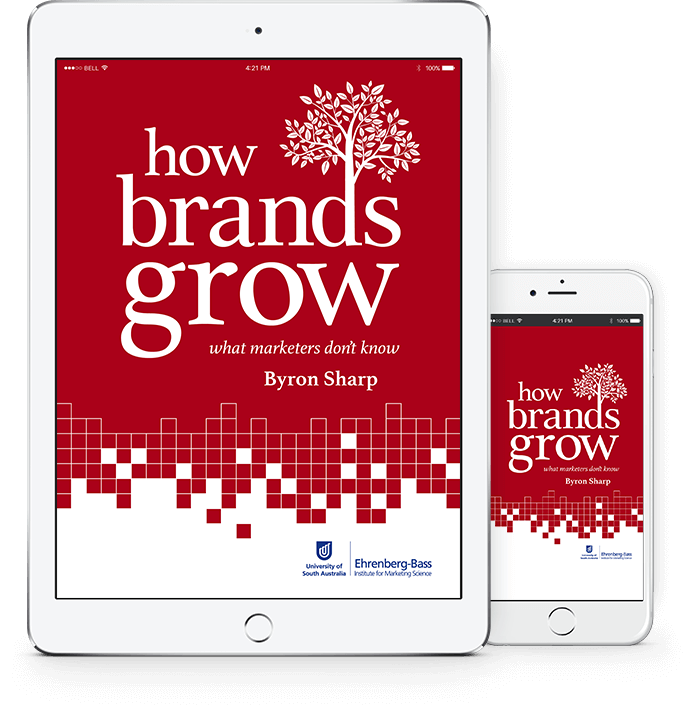
15th of October 2015

Grow Brand Grow
THE PROBLEM
Conventional marketing wisdom has been misleading marketers for decades. Marketers using such antiquated assumptions will very likely see their marketing activities fail.
THE REALITY
Contrary to traditional marketing theory, marketing actually works within empirical and predictable patterns of buyer behaviour. Tested over a wide range of conditions, and over long periods of time, these marketing laws dictate how buyers behave and how brands perform.
THE SOLUTION
Evidence-based marketing gives CEOs the confidence to set strategies that deliver real growth. Insights from How Brands Grow help marketers understand marketing science, while Corporate Sponsors can delve deeper into the Ehrenberg-Bass Institute’s research.
Professor Byron Sharp is Director of the Ehrenberg-Bass Institute, the world’s largest centre for research into marketing. Here, he takes us on a journey to smarter, evidence-based marketing.
In 2010 Professor Byron Sharp, Director of UniSA Business School’s Ehrenberg-Bass Institute, launched How Brands Grow. It was the first book of its type to use the laws of marketing science to debunk myths around brand growth and how it relates to sales growth. The book sold out within days and was voted Best Marketing Read Summer 2013 by Advertising Age readers. unisabusiness talks to Professor Sharp before the launch of the new book, How Brands Grow—Part 2. Co-authored by Professor Jennifer Romaniuk, this much anticipated new release takes readers further on a journey to smarter, evidence-based marketing.
It’s been five years since the launch of How Brands Grow, how do you think it has affected the marketing industry?
At a recent conference in Sydney, renowned consumer psychologist, Adam Ferrier, announced that there is not a place he goes without hearing brands talking about the Institute’s work and said “it seems like Ehrenberg-Bass is the new frontier of marketing.” That’s pretty nice to hear. Only a decade ago some people thought the very term ‘marketing science’ was weird. Now, more than ever, there is a thirst for evidence-based marketing guidance. How Brands Grow gave senior marketing executives a
new language to use in the boardroom, a language that CEOs and CFOs understand. It gave them certainty and strategy. And it was a case in point
for the Ehrenberg-Bass Institute. It broadened our reach and has given us the opportunity to communicate with
a far greater audience. For us, this has meant rapid growth and we are now
the world’s largest centre for research into marketing.
With the media landscape changing so rapidly some would find it hard to believe that the rules of marketing can remain static, how do you counter their argument?
You may have heard me use the architect analogy before; it still stands. Fashionable aesthetics may change, buildings can look remarkably different but architects must still work within the framework of physical laws. If they don’t, all of their creativity will quickly result in a pile of rubble. Marketing is the same. Yes, it requires creativity. Yes, social media has added a new
way people can communicate. But, our research reveals predictable patterns in how buyers buy, and how sales grow. And the patterns are holding true.
Just how important is branding to sustainable and profitable growth?
Outside of mining companies there is scarcely a large company in the world whose business isn’t built on a brand. Contrary to fashionable marketing theory the value of this brand isn’t because it has made a few people fall in love with it. It isn’t because it engenders ‘loyalty beyond reason’. The power of branding comes from what we know about light buyers. In order to grow sales, a product must be lodged and refreshed in the memory structures of large audiences of light buyers. Money spent on marketing is wasted unless companies know and consistently use their distinctive brand assets. Branding is the key to keeping a product strategically and sustainably ‘front of mind’.
What are the most common mistakes that businesses make with branding strategy?
The most common marketing mistakes made are based on incorrect assumptions about how buyers buy. And it is this first mistake that quickly snowballs into a long list of marketing mishaps. I’ll start with making packaging changes that reduce a brand’s ability to be noticed; a good example of this is Tropicana orange juice which saw an immediate dramatic drop in sales after replacing its iconic orange-with-a-straw logo with a plain glass-of-juice. After a month, the distinctive image returned to the packaging—but at a reported cost of $26.3 million in sales. Another common mistake is creating advertising that doesn’t build or refresh relevant memory structures. There are many more I could list, but I think one of the most topical is the notion that highly- loyal customers will grow your business. Over-investing in loyal customers at the expense of reaching new buyers will not lead to sustainable sales growth. And yet, we live in the age of the loyalty program, which in administration alone sucks valuable dollars from a company’s profit.
With the impending release of the new book, How Brands Grow – Part 2, what can you reveal?
In the new book Jenni and I fill in some obvious gaps, like industrial (B2B) marketing, online shopping, services and durables, and we provide lots of evidence from high growth ‘emerging markets’ like China, India, Russia, Indonesia, and Brazil. We even cover luxury markets, with some exciting new research on perceptions of brand exclusivity and desirability.
Readers of the first book, How Brands Grow, will also be pleased to hear that there is more on strategy execution in the areas of mental availability and distinctive brand assets.
And again we show scientific law-like patterns that explain and predict. More evidence that the social sciences can indeed have laws, you just have to look for them.





